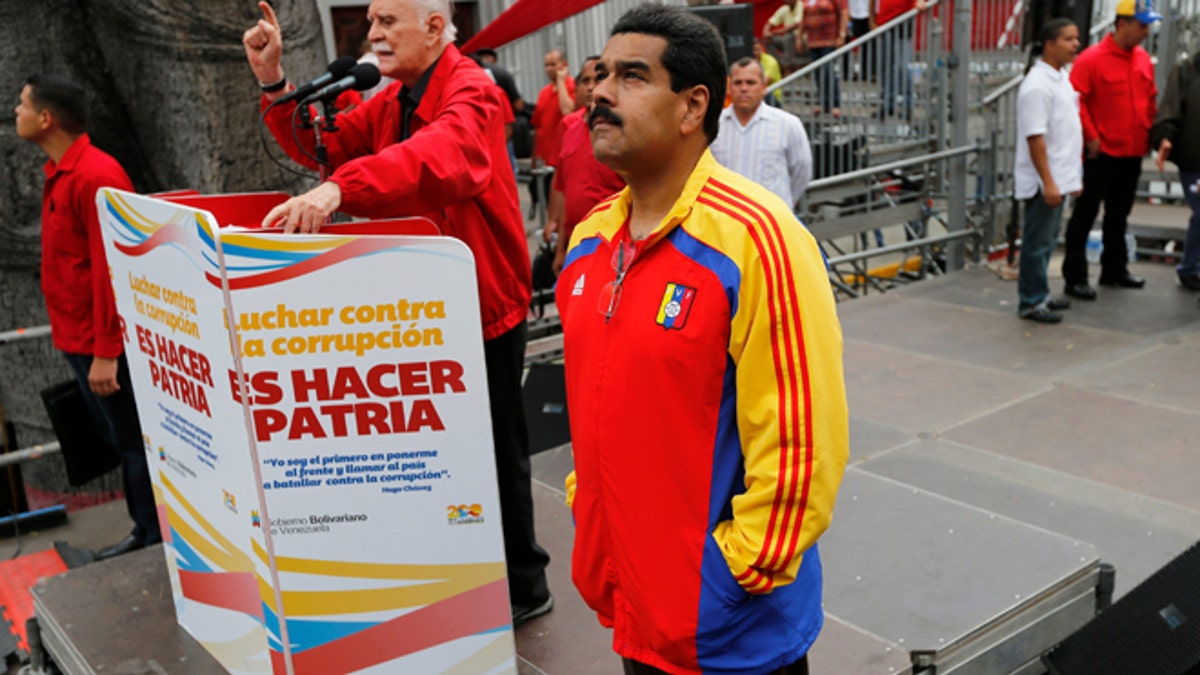
Venezuela's President Nicolas Maduro waits his turn to speak during a march against corruption, in Caracas, Venezuela, Aug. 3, 2013. (AP2013)
Venezuela’s economy continues to plummet as more bad news trickles in and President Nicolás Maduro looks to deflect blame from his policies.
Banking giant JP Morgan released estimates earlier this week that point to low growth and high inflation in 2013 and 2014. The calculation states that Venezuela’s consumer price index (NCPI) is likely to hit 45 percent in 2013, considerably above authorities' projections (14-16 percent).
Adding to the inflation woes is the drop in the country’s exchange rate with the U.S. dollar, with JP Morgan's estimating that it will move from 6.3 bolivars per dollar to 8.5 bolivars per dollar. The country’s economic growth is estimated to be around a meager 3 percent.
The news comes almost a month after a report that Venezuela's currency dropped by more than 75 percent since the death of President Hugo Chávez back in March. Analysts said the country's instability and attempts to halt double-digit inflation are contributing to the steep drop in the value of the bolivar.
"The increase in government expenditures has a lot to do with this," Alejandro Arreaza, Latin America economist for Barclay's Bank in New York, told the L.A. Times. "Until last year we had seen relative stability in the currency markets."
In May, Venezuela's National Assembly moved to wipe up a messy situation involving the South American nation running low on toilet paper. In an effort to relieve a chronic shortage of the vital bathroom hygienic product, lawmakers in Caracas approved a $79 million credit for the country's ministry of commerce to ship in toilet paper, toothpaste and soap from overseas.
The shortages and sagging economy have caused anger and concern among many Venezuelans, while Maduro has attempted to blame the economic woes on "sabotage" from opposition-linked business leaders whom he claims have artificially created product shortages.
"I call on the whole country to join this battle for the economic security of the nation, the battle to ensure steady food supplies for our people," Maduro said during a televised meeting with pro-government activists, according to Reuters.
In an attempt to curb the so-called “sabotage,” Maduro announced the creation of the “Superior Organ of the Economy," an organization charged with visiting private companies involved in food and basic consumption good. Maduro also announced the creation of a hotline - 0-800-SABOTAJE – where people can report irregularities.
Critics of the Venezuelan leader said that his administration is paranoid and peddling conspiracy theories instead of owning up to the economic problems created by strict regulations of private enterprise set under the Chávez administration.
The new watchdog organization comes in addition to two other consumer groups that critics claim strictly enforce a set of price controls that forces businesses to sell their products below production costs.
Follow us on twitter.com/foxnewslatino
Like us at facebook.com/foxnewslatino








































